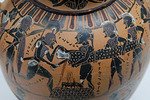
Polyxena
Polyxena was a princess of Troy in Greek mythology, daughter of King Priam and Queen Hecuba. She was the Trojan equivalent of Iphigenia, daughter of Agamemnon and Clytemnestra who was sacrificed so that the Greek fleet would sail to Troy. According to a prophecy, Troy would not fall if Prince Troilus, brother of Polyxena, would survive to the age of twenty. When Troilus and Polyxena were fetching water from a nearby spring, they were ambushed by the Greeks, and Troilus was killed by Achilles. Polyxena was taken as a hostage, and soon earned the trust of the great warrior, who was still recovering from his close friend Patroclus' death. In fact, he told her his greatest secret, the vulnerability of his heel. When Polyxena told Achilles to meet her at the temple of Apollo, he trusted her, and there, he was ambushed by Paris and Deiphobus. They shot a poisoned arrow, which, guided by Apollo, found Achilles on his heel and resulted in his death.
According to some sources, Polyxena killed herself out of guilt for Achilles' death. However, most agree that at the end of the Trojan War, Achilles' ghost appeared before the Greeks, saying that to have favourable winds on their way back to Greece, they should sacrifice Polyxena at the foot of the hero's grave. Hecuba pleaded not to lose another child, but a brave Polyxena said that she preferred to die as a sacrifice for Achilles than as a slave. Neoptolemus, the son of Achilles, was the one who slit Polyxena's throat.
See Also: Priam, Hecuba, Trojan War, Iphigenia, Agamemnon, Clyemnestra, Troilus, Achilles, Patroclus, Apollo, Paris, Neoptolemus
Polyxena Q&A
Link/Cite Polyxena Page
Written by: The Editors of GreekMythology.com. GreekMythology.com editors write, review and revise subject areas in which they have extensive knowledge based on their working experience or advanced studies.
For MLA style citation use: GreekMythology.com, The Editors of Website. "Polyxena". GreekMythology.com Website, 09 Mar. 2016, https://www.greekmythology.com/Myths/Mortals/Polyxena/polyxena.html. Accessed 26 April 2024.






